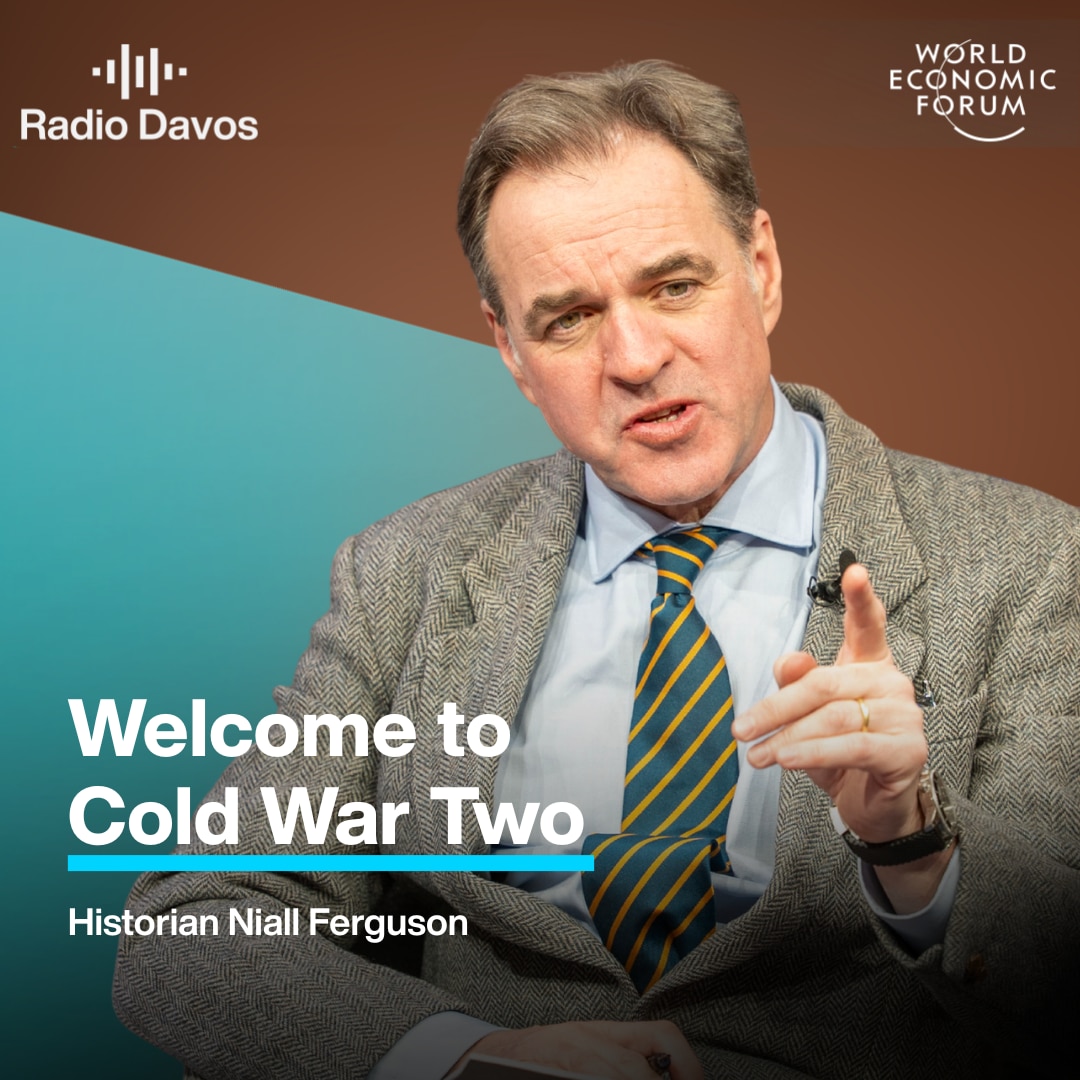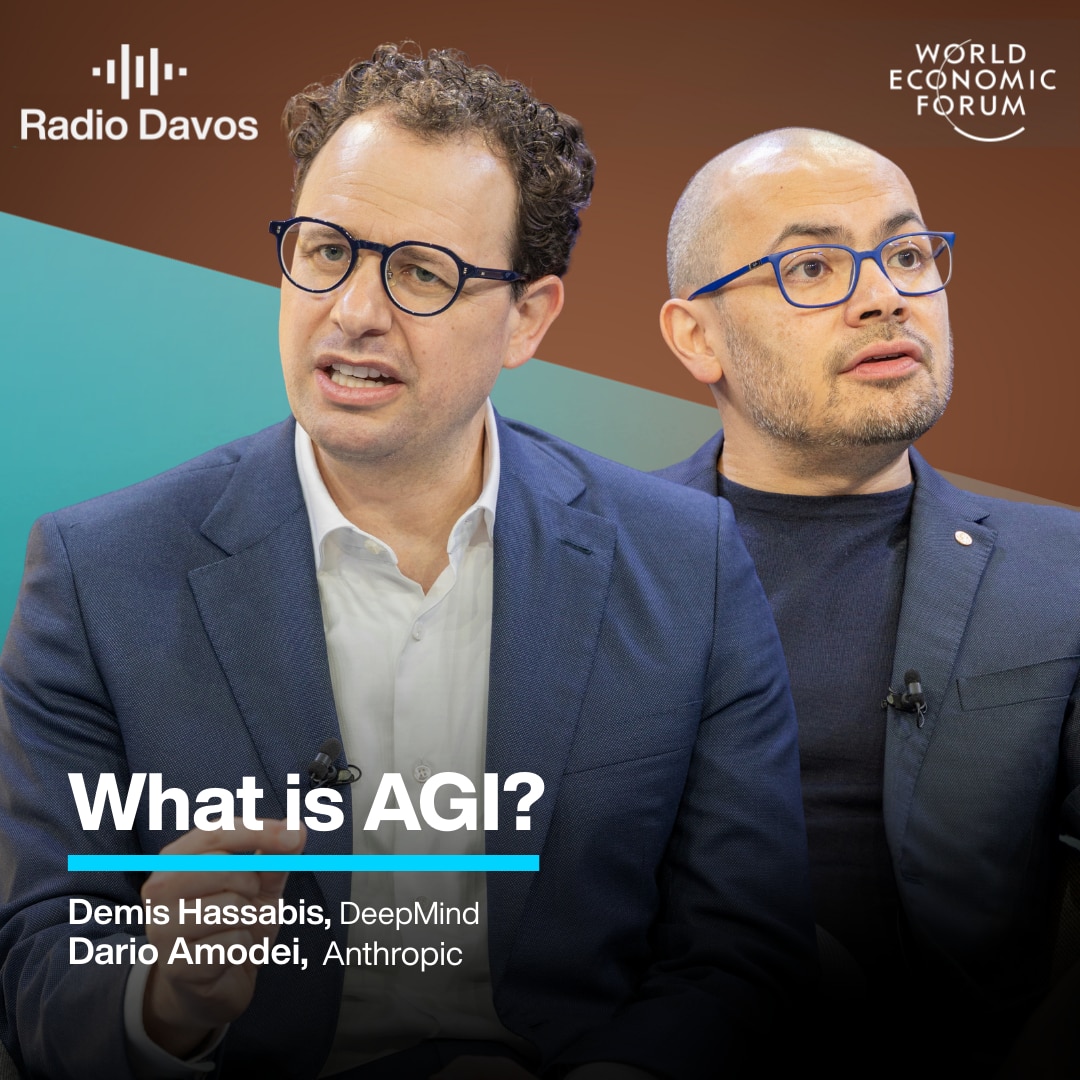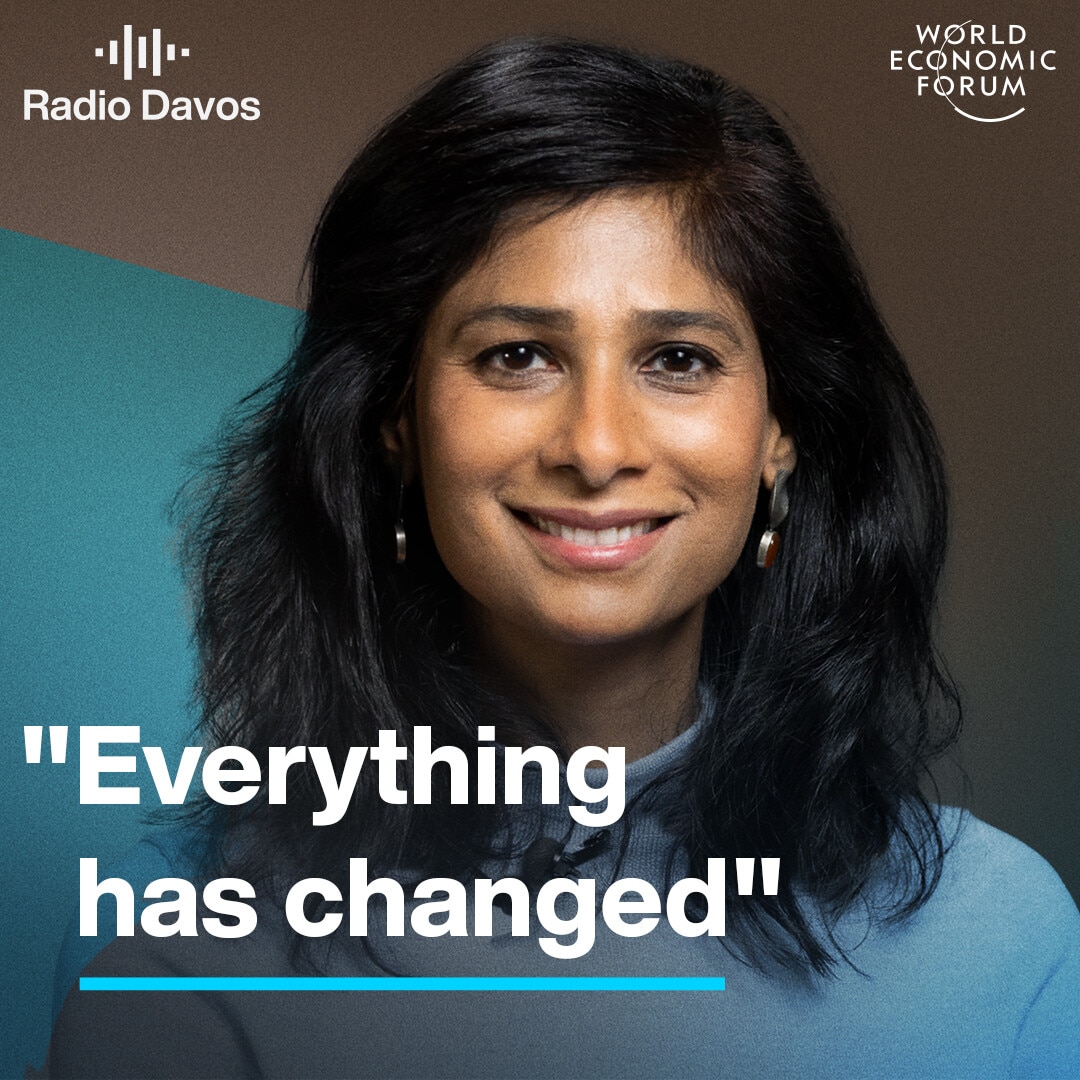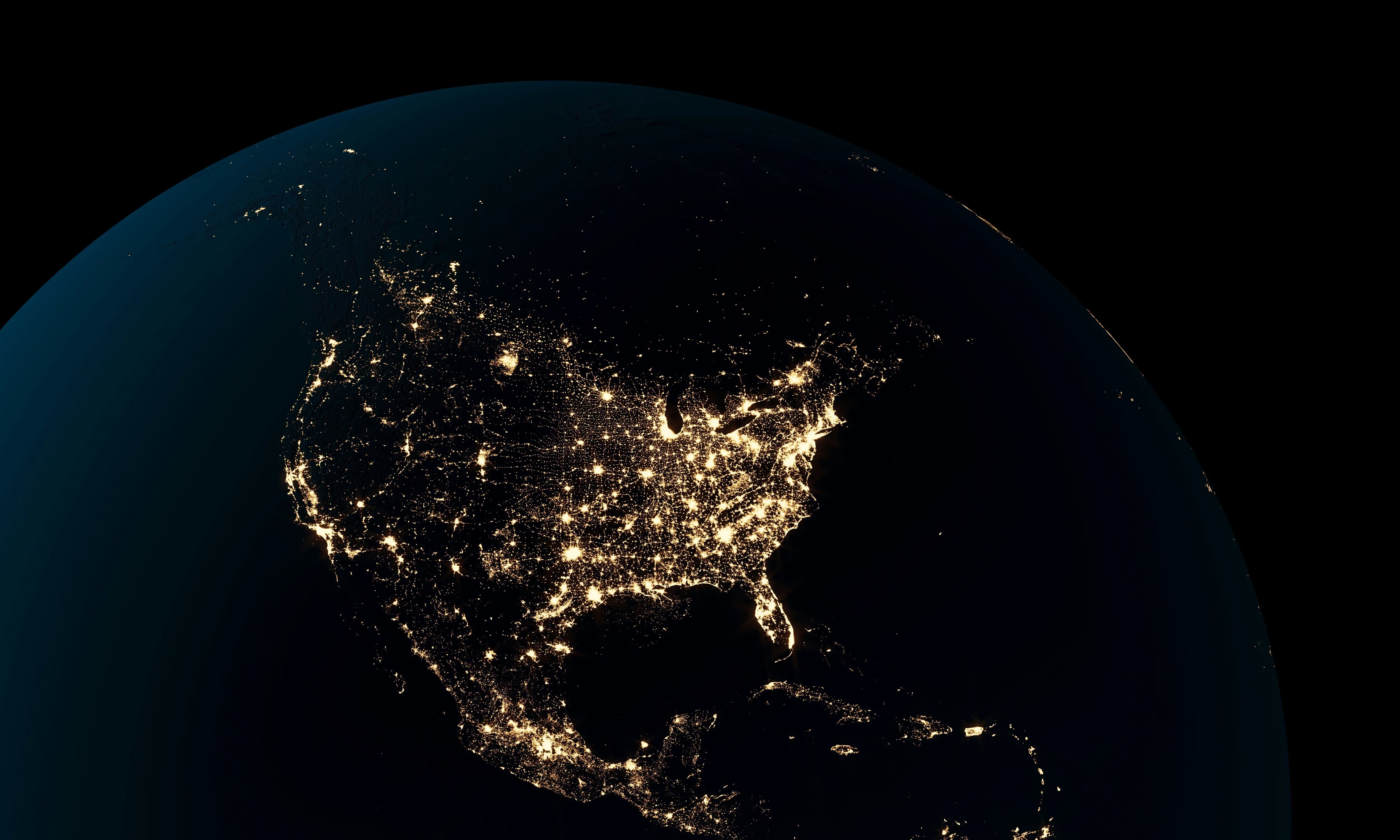Instability, inflation and the 'polycrisis' - the Global Risks Report half a year on
ポッドキャスト・トランスクリプト
This transcript has been generated using speech recognition software and may contain errors. Please check its accuracy against the audio.
Peter Giger, Group Chief Risk Officer at Zurich Insurance Group: Geopolitical tensions have not eased, the war is still ongoing, inflation is still out there. But we got used to it.
Robin Pomeroy, host, Radio Davos: Welcome to Radio Davos, the podcast from the World Economic Forum that looks at the biggest challenges and how we might solve them.
This week, as summer in the northern hemisphere draws to a close, we take stock of the Global Risks Report 2023, and ask whether things have changed since its publication at the start of the year when it heralded the era of the ‘polycrisis’.
Carolina Klint, managing director at Marsh: It's been one blow after the other to global supply chains, one thing after the other.
Robin Pomeroy: Two experts give us their verdict on whether the world focused on the right risks at the start of the year, and consider whether new risks have emerged - AI anyone?
Peter Giger: I think it's a typical example where a technology is overly hyped
Robin Pomeroy: We’ll debate that. And ask whether climate change is still the biggest risk to us all.
Carolina Klint: Absolutely. I think it remains the biggest long- term threat facing humanity. There's no way of sugarcoating it.
Robin Pomeroy: Yes, we’re talking risks, but don’t worry, it’s not all doom and gloom.
Peter Giger: Keep the optimism. Because, despite all the risks and the issues that we're discussing, I think the world was never a better place to live.
Robin Pomeroy: Subscribe to Radio Davos wherever you get your podcasts, or visit wef.ch/podcasts where you will also find our sister podcasts, Meet the Leader, Agenda Dialogues and the World Economic Forum Book Club Podcast.
I’m Robin Pomeroy at the World Economic Forum, and with this look at the Global Risks Report, half a year on, and how people and organisations can meet the challenges...
Carolina Klint: That's been a huge pivot in terms of strategies for many global companies.
Peter Giger: People totally overestimate the short-term impact and totally underestimate the long-term impact.
Robin Pomeroy: This is Radio Davos
At the start of this year, the World Economic Forum published its annual Global Risks Report - a major survey of sentiment about what are the big things that could go wrong - in the economy, the environment, in health, cybersecurity, geopolitics - and more.
Here on Radio Davos we welcomed two of the people involved in the report to talk about it, and this week they’re back, to discuss how the 'risk landscape', as it is sometimes called, has changed in the few months since then.
One thing really stood out for me in this conversation - and that was this reflection on human nature: humans can get used to change quite quickly - and that can be good to help us cope with new threats, but also bad in that we can too quickly forget about risks that we perceive as having receded - for example, did we really learn the lessons from COVID?
To discuss all this and more, I spoke to Carolina Klint, managing director at risk and strategy services firm Marsh McLennan, and Peter Giger, Group Chief Risk Officer at Zurich Insurance Group.
I started by asking Carolina to remind us exactly what is the World Economic Forum’s Global Risks Report.
Carolina Klint: The Global Risks report is this amazing report produced every year by the World Economic Forum, where Marsh McLennan and Zurich have been partners since the very beginning, 18 years ago. And it provides a perspective on major risks to global prosperity. And it includes then economic, environmental, geopolitical, societal and technological risks.
And I always view it as a very helpful reference point when thinking about the emerging risk landscape and those key threats that you need to keep an eye on. And also, when you think about how resilient an organisation is to all of these things that are moving on the risk landscape.
It is based, the report is based on a survey that taps into 1,300 experts from across the world. And these experts represent business, governments, NGOs, international organisations and academia. So it's a very broad report and it gives a really fantastic macro perspective on the global risk landscape.
Robin Pomeroy: And that macro perspective, I guess, as individuals, depending on how much we worry and we're anxious about things, those things we're worried about are the risks to us as individuals. Where is my job going? Can I afford my rent? What's going on in the environment around me? Illness in the family. But these are the macro risks that face all of us as individuals, but also governments and businesses.
Peter, you're a risk officer. For anyone who doesn't know what that is. What's a risk officer?
Peter Giger: As a as a risk officer, you're mostly concerned with the things that can go wrong. But I'm kind of very focussed on the fact that we are experts in risk not experts in fear. Because people typically fear things that can go wrong because they're not prepared for it. And our job is to kind of keep us prepared to think about mitigation, to develop mitigation strategies, implement them so that we don't need to fear things that can go wrong or be adverse.
And as such, as a risk officer, whilst you're dealing with downside all the time, it's actually a job where you should be an optimist.
Robin Pomeroy: That's a great perspective. Thank you. Because we're going to delve into some things which perhaps could make people pessimistic.
Now, the report, as you say, is an annual report timed to come out just ahead of the World Economic Forum's meeting in Davos. And it did this year. And you were both on Radio Davos talking about that. People can go back, I think it was January 11th is the episode where we had you both on talking about what was in that report. And the reason we've brought you back now as we record this is the start of September, and we're thinking, how have things changed over that last half a year.
But let's just look back briefly at, you know, the kind of the headlines from that report. I'm going to read a bit of the executive summary, which says, and I quote:
"The first years of this decade have heralded a particularly disruptive period in human history. The return to a 'new normal' following the COVID-19 pandemic was quickly disrupted by the outbreak of war in Ukraine, ushering in a fresh series of crises in food and energy – triggering problems that decades of progress had sought to solve."End quote.
So not a very optimistic start to that. And Peter, in that podcast in January, you said:
Peter Giger (speaking on January 2023 episode): "We're coming out of an era of almost unnatural stability that we saw for maybe 15, 20 years. Because if you look at human history, what we experienced tod ay seems not so out of the norm when stability is something that was not observed in history for very long periods of time."
Robin Pomeroy: The headline and the buzzword at Davos in January was this 'polycrisis'. There were these interlocking crises economic, geopolitical, environmental, etc., etc.. How are things looking six or so months later? Are we still in a polycrisis? Are we still in instability that maybe we hadn't seen for quite a few years?
Peter Giger: I think we are. We just got more used to it. If we look at the facts, I mean, geopolitical tensions have not eased, the war is still ongoing, inflation is still out there. But we got used to it. Humans get used to circumstances very quickly. What they really don't like is change. And that's what creates the anxiety.
I think if the current situation persists, people will not be overly anxious about it, because now we dealt with it for half a year, we'll deal with it in a way. If you change any of the factors, that's a source of new uncertainty, right?
Robin Pomeroy: You're talking about kind of global outlook. Obviously, if you're in a war zone and horrendous things are happening, that's not just Ukraine, there are there are conflicts going on around the world, obviously, those people are directly affected. You're talking about the view seen from one step removed, I guess, is you get used to this quickly.
Peter Giger: I would suggest even people within war zones get used to it because they continue living their lives as best as they can and they get used to circumstances. That's basically why the human race got so successful on the planet, because it's incredibly adaptable.
Robin Pomeroy: Let's delve into the economy, shall we, first? Because a lot of that instability also led to cost of living crises in many countries, inflation that we hadn't seen, certainly in the developed world, for maybe a generation or two. And the macroeconomic impacts of that when it came to interest rates. Has any of that settled down over these six months?
Carolina Klint: I mean, it's been quite stressful, right? But I think, generally speaking, strong action by authorities at least contained the turbulence that we started seeing playing out in the US and the Swiss banking industry. So that reduced that immediate risk of a total financial turmoil.
But on the other hand, we're not out of the woods yet. We don't know. I mean, inflation could remain high and even rise if further shocks occur. And I mean, it could be an intensification of the war in Ukraine, for example, or extreme weather related events that could trigger even more restrictive monetary policies. And then we're in trouble again. So I think we're still waiting to see.
But I think that that very stressful moment in time that we were living through for a second at least that's settled a little bit, I would say.
Robin Pomeroy: So that fear of inflation really spiralling out of control in economies where it had been very, very low. You think that fear has subsided to some extent?
Carolina Klint: I do, but then again, I do think that China opened up and I think recovery has been a little bit slower than expected. We see this massive crisis in the construction property sector in China and we don't really know how that is going to play out because it could have some negative cross-border spill-overs.
So I think there's a lot of different moving parts that we just need to pay attention to.
Robin Pomeroy: Let's talk about China a little bit then.
Has the rebound out of COVID and the rebound from China, which has been potentially a bit less spectacular than expected, how are people who are looking at risks, looking at global economic growth right now compared to, say, six months ago?
Peter Giger: We look at the situation that is not really stable. As Carolina has said, there is lots of uncertainty lingering around. And I mean, confidence is one of the most important factors to fuel growth. People make investments. They plan if they're confident about the future.
And I think there obviously is a lack of confidence and a lack of trust in in where all the world's going. And that's not so easily re-established, I would say, because we came out of a relatively stable and naive period where we deferred issues to the future and many of these issues we now have to deal with.
I mean, the Ukraine situation didn't come overnight, but we deferred the issue. The whole inflation is the result of deferring issues and putting them on the central bank balance sheets and government spending.
So we're dealing with issues that we've built in the past, and I think we cannot expect them to go away very quickly. I mean, we've built them for over a very long time.
Robin Pomeroy: And what about this issue of globalisation or deglobalisation? There's lots of talk of 'friend-shoring' supply chains. It comes down a lot of this discussion to a rivalry between the the big economic superpowers, the United States and China, at the moment. We've also had this, since this report came out, this suggestion that the BRICS bloc could expand and try to rival, Brazil, Russia, India, China, South Africa could then expand to other countries. We saw that just a few weeks ago. This probably wasn't on the cards when this report came out, when you were talking to us in January.
Should we be taking seriously, this idea of supply chain disruption or realignment? Or is it a bit of a red herring, do you think, in terms of what kind of risk does it pose to the economy?
Carolina Klint: Well, you know, I think you're right, because with the current geoeconomic confrontation that we see playing out, we also see nationalistic policies being developed. And as a result, countries are increasingly looking to build self-sufficiency. And of course, that's going to take a toll on globalisation.
But it's also really highlighted how fragile and unreliable global supply chains have become.
And this is not actually a recent thing because we talked about China. I mean, if we back up a little, the challenge started already in 2019 with the China-U.S. trade war and then of course, was further amplified with the pandemic. And then we had the Ever Given ship that got stuck in the Suez Canal, which didn't help at all. And then Russia invaded Ukraine, which I mean, it's been one blow after the other to global supply chains, for one thing after the other.
And then in the past year, of course, due to the geopolitical tensions, sanctions and trade controls have significantly increased. And I think that's something that companies that are trying to move goods across the world just need to continue working on finding and identifying opportunities to create more slack in the system, because we're really moving from a just in time strategy to more of a just in case methodology, because just in time doesn't work anymore.
So we have really seen how companies are strengthening control over supply chains and they are looking to identify alternative suppliers. They're stockpiling, bringing production closer to home or even even acquiring suppliers or clients to increase that vertical integration, which wasn't the case just a couple of years ago, is more about consolidation and really spinning off business that wasn't core.
So that's been a huge pivot in terms of strategies for many global companies. So there are a lot of interesting aspects on this.
Peter Giger: At the end resilience comes out of redundancy also in supply chains, which comes at the cost of lower synergies.
And I think the chip industry is a perfect example. I mean, the chip industry has reached a level of integration where the world is hardly big enough for the industry. So if you now want independent chip industries in the various blocks, and it's anyone's guess how many there should be, start with two, there will be a wealth effect. And are we prepared to pay the price? I haven't heard that debate held in earnest. Because there is a price to pay for independence. And what is the price we are prepared to pay for that independence as individual nations, as regional economic areas?
But at every level, I think, we will need to debate, at the time when our national governments have pretty much exhausted their coffers, so they're not really able to invest heavily without fuelling inflation again.
So I think it's a pretty tricky situation and it will come at a cost and nobody wants to talk about the cost.
Carolina Klint: I completely agree with that. And I think taking us back to your quote earlier, I think in the past decades that the relative predictability of the business environment, now taking this into a business context, has really enabled companies to pursue incredible efficiency. And that, in turn, has helped fuel exceptional profit growth.
But on the other hand, that focus on efficiency, again, has left companies very vulnerable, very lean, vulnerable to shocks. And I think looking back in past times, maybe we did reward efficiency of resilience too much and maybe we rewarded growth over sustainability a bit too much.
And by doing that, we created this resilience debt by not responding to and preparing for emerging risk and now waking up and realising that we need more slack in the system, we need to focus more on building up resilience. But to your point, there's a price tag, and I think it is not easy because it is a cultural change that is necessary for for that to actually happen.
But on the other hand, I do see in the discussions that I have with large companies that the interest of understanding the concept of risk and resilience and working to connect risk and resilience to the strategy of the company has increased dramatically. I would say.
Robin Pomeroy: I wonder when you're looking at risks, whether you're also looking at opportunities, because it's sometimes a two sided coin, isn't it? If there's this realignment of globalisation, there's great opportunities there for some companies, for certain people, they'll be jobs coming to places where they weren't before. Whether that's in other parts of the developing world, Africa, for example, or back in more developed countries that for decades have been offshoring some of those jobs.
I mean, there's a cost to this, but there are also for some parts of the economy, there will be benefits, right?
Peter Giger: Absolutely. Change is a source of risk, but also opportunity. Question is, who is willing to grab the opportunity and take the risk of the change and who is basically trying to preserve the status quo?
And again, that is like, at the individual company level, an entrepreneurial decision that every company will take and it will discriminate winners and losers depending on where the world goes. The same will apply at the policy level for nations.
So it is a question that we are all confronted with and nobody knows the answer, luckily. So there is the opportunity.
Robin Pomeroy: I'll just do a plug for Radio Davos here: on the chips thing that you mentioned, why that's so vital and why that's so important, there's an episode of Radio Davos on that that people should listen back to that, it explains - it's quite eye opening to anyone who's not give a much thought to chips and their importance and their cost of creating a factory to produce them.
Let's perhaps move on from the economy, although we're going to carry on talking about it because it touches everything.
In the Global Risks Report 2023, it was saying the near-term biggest risk was cost of living - cost of living dominates global rates the next two years. But in the longer term, it comes back to climate change. Climate action failure dominates the next decade. So let's see how things may or may not have changed on that front in the six months since we last spoke.
In 2022, there had been a lot of weather disasters. Has 2023 been any different? I don't think so. We've seen forest fires and droughts and floods and bigger hurricanes. So is extreme weather a new normal and are we learning to adapt?
Peter, you work in insurance. This is such a massive issue for insurers, right?
Peter Giger: Climate change is a much bigger issue for anyone who holds property than for an insurance company.
I know that you're often in the public spotlight, but people seem not to appreciate that we basically underwrite our risks every year. So by 2050 we will have re-underwritten our books 27 times still. So we will adapt. Certain of the properties that are in the wrong locations will find it much harder to adapt to climate change.
And I think that's the ugly reality that we're starting to see, is that certain places that were perfectly fine to live in will become very uncomfortable and will become exposed to regular natural disasters to a point where insurance companies may no longer be able to offer premium or the premium will be such that people are no longer willing to pick it up.
I mean, we already see that in places like California, where some of the homeowners rather go uninsured because the premium is prohibitive from their perspective. While, from our perspective, it's not sufficient.
And I think that process will be very painful in parts of the world because high values are at stake. But then you wonder how people still build in some of the most exposed regions.
Robin Pomeroy: Are you talking about low lying areas susceptible to sea level rise or areas susceptible to those natural disasters such as forest fires and extreme temperatures, or both and more?
Peter Giger: Both of them.
Carolina Klint: I would add, it's not only property. I mean, we're now starting to see climate change and extreme weather events impact other areas and with some quite unexpected consequences.
So one example is the Mississippi River has had historically low water levels, and that's impacted supply chains. It's been very difficult to get fertiliser into the U.S. and it's been quite difficult to get grains and agricultural products out of the U.S.. But a very unexpected consequence, too, is that it's been difficult to get the glycol into airports in the middle of the U.S. And because of the really tough winter, many airports and many airlines actually struggled with keeping aeroplanes in the air because they did not have glycol for de-icing.
So it just goes to show that there's a chain here that you really need to pay attention to consequences that might be, you know, really, really tough to predict, but that are actually consequences of climate change.
Robin Pomeroy: This is probably why climate change, year after year in this report, remains top of the agenda, not just because it's potentially an existential risk to humanity, but also because it has these completely unpredictable impacts, which we're feeling right now, not in 2050, but today and we've been feeling for years, actually. So this is why climate change is going to remain at the top of this list. So I imagine in next year's report and for the coming years, right?
Carolina Klint: Absolutely. I think it's going to, it remains the biggest long term threat facing humanity. I mean, there's no way of sugarcoating it.
Robin Pomeroy: I wonder, does biodiversity come up in the report? Because this is we've got a COP coming up, the conference of the parties to the UN Climate Convention, and I think nature-based solutions and concerns about destruction to nature are going more and more hand in hand with concerns about climate. And there is, as a report that's coming out from the World Economic Forum puts it, there is already a financial cost paid by companies for destruction to the natural environment.
Is this something you've looked at or is it being more on the back burner compared to climate change?
Peter Giger: Well, I think it's actually even directly correlated because the more biodiverse the system and ecosystem is, the more likely it is to adapt to climate change.
We see that with many of the European forests, which are lacking biodiversity and are highly threatened by hotter and drier summers. They may not make it and forest is not something you replace quickly.
So I think we have living examples how to interact and how. I mean, you see how species start to change migration patterns, all these things. There is a limit to how quickly nature can adapt.
And I think one of the cliff risks that we have is that that whole ecosystems collapse because of one of the contributors to the chain of life is failing. And that's the biggest concern in the biodiversity area is this type of cliff risks. These systems don't behave in a linear way.
Carolina Klint: We've also seen the situation where food security has been a bit of a topic right then, and those aggressive agricultural methods to address food security could actually degrade ecosystems. So, I mean, it's just there's a lot to pay attention to and we need to be very, very careful.
Robin Pomeroy: And should there be any cause for optimism on climate and biodiversity? We've seen policies, for example, in the USA, lots of money going into green energy, this kind of thing. We've seen a conference underway in Africa looking at climate change in a way that they perhaps haven't before on that continent.
Should we have any reason to be optimistic as the climate conference in the United Arab Emirates approaches?
Carolina Klint: There's always reason to be optimistic. And I do think the rise of stakeholder capitalism and shareholder activism is actually pushing companies to take action and to really leverage ESG targets and metrics and look at the ESG based investments and push that agenda much more aggressively.
And then, of course, the energy crisis that was laid bare when Russia invaded Ukraine, and the dependency that Europe had on Russia in terms of energy and gas. At the point it felt like we were all going back to fossil fuels to keep factories running and keeping the lights on. But at the same time, I think it has triggered and accelerated that drive for green energy, which is actually really, really positive.
Peter Giger: That's for me one of the key sources of optimism is if you show how quickly some of the adaption processes have kicked.
Now that the flip side is it was based on price signals and all that politicians seem to do is try to suppress price signals. If we only let energy have a meaningful price, you see how quickly consumers react, how quickly they're putting solar panels on their roofs if electricity becomes expensive.
And still we don't seem willing to learn from this real life example that we just lived through in Europe, how quickly we could adapt actually our economies.
Robin Pomeroy: So that climate and the economy together. Let's look at new risks. Have any new risks emerged since you were on Radio Davos in January, since the Annual Meeting in Davos?
The one that has occurred to me, it's not a new risk, but it's the one everyone's been talking about since then, is the rise of artificial intelligence. Is that a risk? Is that going to feature in the next Global Risks Report?
Carolina Klint: I would expect so. I don't know, Peter. What do you say?
Peter Giger: Well, you know, sometimes the short-term risks in the Risks Report could actually be generated by ChatGPT.
Robin Pomeroy: Why don't you save yourselves a job and let ChatGPT write it next time?
Peter Giger: It is kind of very much influenced by the headlines we're all bombarded with every day.
AI is a particularly interesting example. I'm not giving away how how old I am, but in the last century, when I studied at university, it was one of my major subjects, believe it or not. And so it is nothing new to it. It's just hyped. I think it's a typical example where a technology is overly hyped in the public domain.
People totally overestimate the short term impact and totally underestimate the long term impact. Ten years from now, we will have adapted our world and AI will be an integral part of it and it will feel just natural. For the next six months? I don't think so.
Robin Pomeroy: Carolina, do you agree with that?
Carolina Klint: I think Peter has a point. But I also think there are other developments. I mean, advances in emerging technologies that, for example, are allowing for the collection of much more sensitive data. That's an aspect that I think we should pay attention to.
Whether it's vocal inflections, facial expressions, other bio-metrics, and that kind of data and the sensitivity of it, how that could potentially in this environment become the target of geopolitical or commercial warfare. Those are aspects that we also need to pay attention to.
Peter Giger: I mean, how far away are we from you Robin generating this podcast without us even knowing?
Robin Pomeroy: Absolutely. It could happen fairly easily, particularly in audio, right now. I've heard my voice, which a colleague of mine created, reading a script made up by AI read by an AI version of me. So I bet there are podcasts out there which sound a bit like this but are created by an algorithm.
Is that a risk? Depends on how people receive it, whether they believe it's real, whether the message within that podcast or blog post or Instagram post is destructive or manipulative. Depends what it is, I guess.
Peter Giger: Well, I think what needs to happen is the same thing that has happened in many other areas. You'll need countermeasures that allow verification. And and it's like like everywhere in cyber warfare, it will be a race and and kind of protecting and verifying your image will will become a technological challenge, but it will become necessary. So the trust that we naturally put in what we see can be protected.
Robin Pomeroy: Right now, I mean, that's already happening to famous people is I think it was Bruce Willis appeared in an advert on Russian TV. Of course, he's now he's no longer even working and he certainly didn't make that advert.
But when will it come to affect normal people, as I consider myself to be? Probably fairly soon.
But anyway, that's another issue that the World Economic Forum looks at very closely, We will be doing more of that on Radio Davos as well. So certainly flavour of the month, whether it's more hyped than it needs to be at the moment. Peter, we'll see. But as you say, it will be transformative in the medium to long term.
Well, I think we've covered the economy, we've covered the environment, we've covered new risks. Any other new risks you want to mention or where do you see things? What are the unknown risks, the unknown unknowns that might crop up between now and the Annual Meeting in Davos? Any ideas where you'll be looking?
Carolina Klint: As a risk professional, I'm always concerned about the things that we don't talk about. The one thing that was missing in this year's report was actually pandemics. I mean, we're not really taking the lessons that we learned or should have learned by navigating through COVID-19. And as a matter of fact, we still live with COVID-19. There are still new versions coming up.
And we don't really know. It looks like they're they may be spread more easily, but they're a little bit less dangerous. But we don't know what's going to happen. And we also don't know what the next pandemic is going to look like.
So I think that is something that we might want to spend a little bit of time on. Both thinking about what are the lessons we learned from COVID-19, but also how would we handle or how will we handle, because it is when it's not if, the next pandemic that takes us.
Peter Giger: And I think Carolina is absolutely right. It's things that nobody talks about that come from left field. My concern is that we are not building resilience.
Governments are not putting money aside for a rainy day. Companies basically manage their balance sheets in a very lean way. If you accumulate too little too much equity, people want the share buyback, but you accumulate that equity for the unforeseen, for the unknown.
And for me, that's a genuine general problem that you're having. We basically have fair weather policies and then you're always surprised if it rains and when will we learn that it's part of the game that after a few nice days will we'll have a rainy day and we'll need to prepare for it.
And then we don't need to know what goes wrong. Because if you build that resilience, if you have your reserves, you'll deal with whatever is confronting you.
Robin Pomeroy: You mentioned at the start of this podcast the human nature that we get used to things very quickly and this is why the humans are such a successful species, but you've just put your finger, both of you, on another aspect of human nature is we forget things, we forget pain very easily. 'This was awful, and I'll never forget it.' And then, have we all forgotten COVID? And do we not think something like that could happen again?
So I suppose that's an inherent inbuilt risk into our human nature. It's great to forget. I love not thinking about COVID any more, but maybe some people should be right?
Carolina Klint: Generally speaking, what we worry about is too short term and modest and I think a little bit more creativity when we think about risk and when we think about resilience could be helpful. And just really taking that holistic view of whatever it is that we're looking at. And of course inviting a diverse team of individuals when you're thinking and talking about risk so that you really bring all of those perspectives to life, because that will enable you to have a much better view on what is coming towards you on the risk horizon.
Peter Giger: Yes. And keep the optimism. I'm coming back to that because, despite all the risks and the issues that we're discussing, I think the world was never a better place to live. And we're very quick in forgetting that.
Robin Pomeroy: Peter Giger, Group Chief Risk Officer at Zurich Insurance, and you also heard Carolina Klint of Marsh McLennan.
The Global Risks Report 2023 is still available to read on the World Economic Forum’s website - links are in the show notes, or just search for it online. And do listen back to that January podcast about it - that’s available on your podcast app, where you can find our entire back catalogue and other great podcasts from the World Economic Forum - they are all available at wef.ch/podcasts and on your podcast app of choice.
Please subscribe to Radio Davos wherever you get your podcasts and please leave us a rating or review. And join the conversation on the World Economic Forum Podcast Club on Facebook.
This episode of Radio Davos was written and presented by me, Robin Pomeroy. Studio production was by Gareth Nolan.
We will be back next week, but for now thanks to you for listening and goodbye.
Scroll down for full podcast transcript.
At the start of this year, the World Economic Forum published its annual Global Risks Report - a major survey of sentiment about what are the big things that could go wrong - in the economy, the environment, in health, cybersecurity, geopolitics - and more.
In this podcast, we invite back the two guests who appeared on Radio Davos in January to talk about the report and its conclusion that the world faced a 'polycrisis' - a combination of risks from many sources.
Carolina Klint, managing director at Marsh, and Peter Giger, Group Chief Risk Officer at Zurich Insurance Group, discuss how the risk landscape, as it is sometimes called, has changed in the few months since then.
January's episode on the Global Risks Report: Welcome to the age of the polycrisis: the Global Risks Report 2023
Read the report
Article based on this episode:
Check out all our podcasts on wef.ch/podcasts:
Join the World Economic Forum Podcast Club
Join the World Economic Forum Book Club
Photo by Sammie Chaffin on Unsplash
その他のエピソード:
「フォーラム・ストーリー」ニュースレター ウィークリー
世界の課題を読み解くインサイトと分析を、毎週配信。








